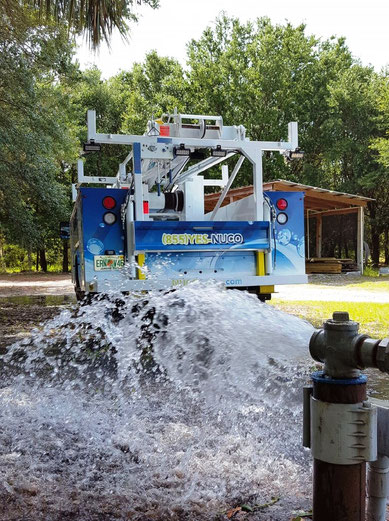Well Maintenance
Frequently, private water wells tapping groundwater resources can provide the highest quality water available to homeowners and businesses. Deep drilled wells recharge themselves, and can provide a constant, steady supply of water that is not easily impacted by dry weather conditions.

These simple steps will help protect your system and investment:
- An annual well maintenance check, including a bacterial test, is recommended. Drinking water should be checked any time there is a change in taste, odor or appearance, or when the well system is serviced.
- Keep hazardous chemicals, such as paint, fertilizer, pesticides, and motor oil far away from your well.
- Periodically check the well cover or well cap on top of the casing (well) to ensure it is in good repair.
- Always maintain proper separation between your well and buildings, waste systems or chemical storage facilities. Your professional contractor knows the rules.
- When landscaping, keep the top of your well at least one foot above the ground. Slope the ground away from your well for proper drainage.
- Take care in working or mowing around your well. A damaged casing could jeopardize the sanitary protection of your well. Don’t pile leaves or other materials around your well.
- Keep your well records in a safe place. These include the construction report, as well as annual water well maintenance and water testing results.
- Be aware of changes in your well, the area around your well, or the water it provides.
- If you have additional questions and need expert advice or services, please Contact NUCO Pump & Well Services.
Why Do Wells Need To Be Cleaned?
Bacteria.
In the upper reaches of the well, the presence of oxygen encourages the growth of aerobic bacteria (bacteria requiring oxygen) and the oxidation of metals. Aerobic bacteria tend to cause clogging by the production of large amounts of slime and the entrapment of oxidized iron and manganese as well as other minerals.
Debris from bacterial activity in the upper portions of the well tends to accumulate at the bottom of the well. Water in the lower portions of the well can become depleted of oxygen due to chemical reactions and bacterial activity, creating an environment for anaerobic bacteria (bacteria able to live without oxygen). These anaerobic bacteria, natural to the aquifer, are often responsible for methane gas, a fishy taste, various odors, and hydrogen sulfide (which causes a distinctive rotten egg odor).


